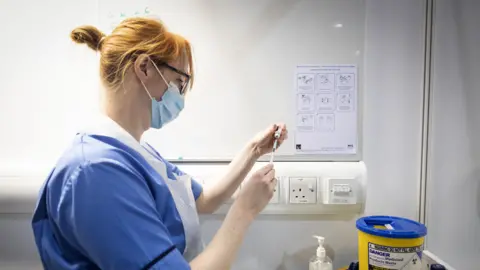Public sector pay: How it is set for workers in Wales?
 PA Media
PA MediaPublic sector workers in Wales are watching closely as pay awards for their counterparts in England are being announced.
Pay deals covering 2.5 million public sector workers, including teachers, nurses, doctors, police officers, and members of the armed forces, are being unveiled.
The UK government is offering below-inflation pay rises of about 5%.
But not everyone working for a public body in Wales will be affected.
How big is the public sector workforce?
The public sector makes up about 30% of the workforce in Wales, so the implications for the Welsh economy are huge.
But many of the 431,000 working for government bodies have pay rates that are decided in Wales, rather than by the UK government.
The picture is complicated, with pay negotiations and other decisions playing a role too.
 Getty Images
Getty ImagesWho already know what they're getting?
Welsh police officers know already they will be getting the same £1,900 salary rise, equivalent to a 5% overall pay award, as officers in England.
Pay negotiations for Welsh firefighters and council workers, like police officers, take place on a wider basis than just in Wales.
The UK government's pay award for members of the armed forces will be the same for those who serve in Wales.
Welsh teachers have been told they will be getting a 5% pay rise for the next academic year, with a plan for 3.5% in the second.
Who's still waiting?
Welsh civil service pay is set directly by the Welsh government.
The UK government has awarded more than a million NHS staff in England a pay rise of at least £1,400, with the lowest earners getting up to 9.3%.
That is based in part on an NHS pay review body recommendation for England, Wales and Northern Ireland.
But it is still up to Welsh ministers to set pay for doctors and nurses in Wales, and no announcement has been made yet.
Organisations like the National Museum for Wales and the National Library - funded by but not part of the Welsh government - also set their own pay.
What could it mean for the Welsh government?
In theory, if the UK government decides to spend more on pay in areas which are devolved like education, then there may be more money for the Welsh government to spend on the same thing through knock-on extra spending.
But in practice, the money the Welsh government gets to spend is determined by many different things and boosts in one area do not always mean more money overall.
That could make it harder for ministers to follow pay rises made over the border if cuts to money from other services need to be found.
